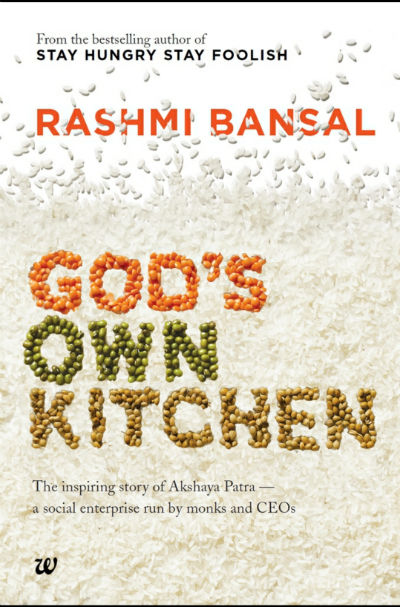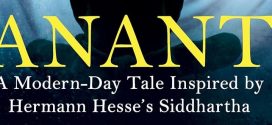It is said that “Books are the best friends a human can have”, and it is true. Based on its genre it may open a virtual fantasy world to you or it may help you witnessing harsh reality. Often it takes you to the tour of a wonderland or opens a compendium of knowledge. Possibly the best thing a book can do is documenting history when it is in making.
While we are bombarded with the wrongs in the society via news (both print and visual media), we often forget to take a note of humanitarian work being done in the society. The people who follow the rules of the society or does even a single bit for the society with the attitude of selflessness are the real heroes of the society. Or in other words, they are the ones who make the “society”.
Recently, we came across a book named God’s Own Kitchen: The inspiring story of Akshaya Patra by Rashmi Bansal, based on a promotion running on Amazon India (which is still running when I am writing this, and possibly throughout the month – June 2019) where Kindle version of the book was available for INR 29 only! Based on the author’s reputation (based on her previous works) and the social movement the book tries to document, how can we let such a fantastic offer go? And, we bought the copy of the book without any further delay :).
| Book Title | : | God’s Own Kitchen The inspiring story of Akshaya Patra – a social enterprise run by monks and CEOs |
| Author | : | Rashmi Bansal |
| Publishers | : | Westland (1 March 2017) |
| # of Pages | : |
264 (Paperback) 39755 KB 264 (Kindle EBook) |
| # of Chapters | : | 27 |
| Purchase Link(s) | : |
We have a long queue of books to be read and share our genuine and unbiased reviews for. However, during an internal discussion, we unanimously agree to prioritize reading this book and sharing our views and reviews at the earliest. The main idea behind was not only just spreading awareness about this genuinely written book and more importantly, the story of Akshaya Patra, but also helping readers by assisting them with unbiased reviews in choosing their next read, while the book promotion is running. The book is originally published in 2017 and such an irresistible book offer are rare to be seen.
From our team, I got a chance to read this book and here are my thoughts about it. So dear reader, go through the review and if you decide to make a purchase decision and if you read Kindle EBooks, now is the right time to buy it.
This Is Here In For You
Book Cover:
Let us start with the book cover. I strongly believe that a book cover makes a huge impact on book purchase and/or reading decisions.

God’s Own Kitchen: The inspiring story of Akshaya Patra – a social enterprise run by monks and CEOs – Providing mid-day means to 1.6 million schoolchildren every day – Book Cover
The book is about a free mid-day meal program for schoolchildren running by ISCON group. The same is reflected on the book cover in quite interesting and effective way. Most of the background is covered by white rice grains! The same way the book title is infused with various other grains. It is quite creative and reflective of the book theme. You may not find the cover page very much attractive at the first glance, but the message it tries to covney, is conveyed quite effectively.
The content of the book is divided into three segments containing 9 chapters each.
- Bhakti Yoga: The power of passion and devotion to a cause (2000-2004)
- Karma Yoga: The science of execution and the art of doing it selflessly (2004-2009)
- Jnana Yoga: Knowledge leads to excellence (2009-2016)
It explores the journey of Akshaya Patra, the movement from being conceived to growing up at such a gigantic scale that it is taken note of worldwide.
Sometimes it requires a small thought or witnessing an incident to start a movement. It is quite similar to igniting a rocket which takes the rocket onto Mars!
On one such day witnessing hungry children rooted an idea of providing mid-day meal to school going children with a vision to provide them a balanced food which satisfy their hunger. It often serve as a motivational factor to bring poor children to school. No philosophy can be digested at empty stomach. A full stomach is required even to concentrate in class.
The small task which started without any proper planning (especially for finance and resources) found the contributors to became what it is in the present time. In fact, the author has noted:
Neither the “angel investors” nor the “founders” of this new enterprise knew what sleeping giant had been awakened.
Views And Reviews:
Talking much about “Akshaya Patra” – the movement and/or the book will result in spoilers, and I will recommend you to read the book instead, so avoiding more details.
Actually, Rashmi wrote a chapter about “Akshaya Patra” in her book – “I have a Dream”. Probably, the idea of this book is rooted from there. The author did a remarkable amount of research for this book (roughly around 1.5 years) and her efforts are reflected in the book. It is nothing less than a documentary about “Akshaya Patra”.
If you love to pay attention to the book, you will witness that the author has explored some of the harsh realities of the society while praising many genuine contributions. Such a balanced approach makes the book even more readable. For example, a sharp reader will not miss these lines:
.. to Anand Teertha and for “VIP darshan”. Entry through a special side entrance, reserved for “important folk” who did not care to stand in line.
Without acknowledging real problem we cannot overcome them. And, the author is quite blunt about that. Here are some more hard-hitting and realistic lines:
What we have today is a crisis of faith. No faith in the government, or in institutions, no faith in ourselves.
— — — — — —
We offer bribes even to God – “Here take this rupee-note, grant my wish!”
Here is a problem mentioned using very few words, but, you can relate to the problem it talks about:
… a roll of the electoral dice can change destiny.
You can see how humble a person can be in various examples explored through the journey of Akshaya Patra. For example, Sudha Murty and his future son-in-law have their first meal together at Akshaya Patra! Unbelievable right? Here are the lines from the book:
… Rishi shared his first meal with his future mother-in-law, not in a fancy restaurant, but in the Akshaya Patra…
Some people have left their jobs to contribute to such humanitarian works, and we cannot get emotional when exploring their journey.
The book has many inspirational lines which on one hand explores the hard realities and bitter facts and at the same time convey an inspirational message. Here is an example:
… no task one undertakes – no matter how noble – is without obstacles.
That obstacles can be overcome, when the mind is clear and the heart has faith.
In fact, in the long journey there came many obstacles including lack of funds. However, the biggest challenge came when the entire movement dragged into a false case. Some people sometimes consider their own small profit more important than the cause. And yes, for many, NGOs are nothing else but a source of income. The book has documented such incidents as well.
You may suggest that the word “Those” instead of “That” could have been a better choice in terms of grammar, but the message it conveys is more important.
People often think that how can we refer to such a task (feeding schoolchildren once a day) as a “movement”. Well, the book has a short and sweet answer to that:
Rarely do we feel thankful, or filled with abundance. Little realizing what it really is – to “not have”.
— — — — — —
… hunger is rarely understood by those with the fortune of a full stomach.
Do you need to possess a large sum of wealth and resources to make a change in society? How can a common man do his/her bits?
It was a bunch of dedicated young men using their common sense. That’s all you really need to do anything useful in this world.
Some measure progress by what they own, others measure it by what they give. Of their time, their money, their expertise.
Yes, you do require an inquisitive mind to think out of the box solutions and a positive attitude to move ahead. The author says:
Any entrepreneurial activity requires you to go beyond what you already do.
— — — — — —
For excellence is a quest. You learn from everywhere and everyone, but deep in your hear, you aspire to be even better.
The book has some philosophical lines and wisdom lessons too.
What the soul feels, the mind desires. What the mind desires, the body undertakes.
Let not the fruits of action be your motive, not let your attachment be to inaction.
— — — — — —
Opportunity is like a cloud: sometimes it appears on the horizon and simply passes by; then, when you least expect it, there is a downpour.
— — — — — —
Kindness is a bridge between people and cultures.
— — — — — —
We tend to celebrate success and to hide failure. But they are two sides of the very same coin. While success makes one arrogant, failure keeps you humble.
The author used simple language throughout the book, so it is appealing even to the young and aspiring readers as well. It often makes you feel that you are reading a PanchTantra tale. Simple yet effective. Here is an example:
… If you leave a sack of rice on the ground, birds will come, take a few grains and fly away. But if a human being comes, he will pick up the entire bag and run away.
The way it explores the logic behind various religious gestures and beliefs is adorable and convincing.
“If you do not take prasad after your darshan, your yatra (pilgrimage) is not complete”
Indeed, the more practical aspect is that when you visit Dharmasthala, you should focus on prayers and meditation, not on mundane questions like “where to stay” and “where to eat”. The temple will provide that.
At the same time, the author makes it clear that neither the monks nor the organization (ISCON) are using this movement to spread their religious beliefs and customs.
Whatever the personal beliefs of the monks, these were not imposed on the children. For the empty stomach of a child knows no caste, creed or religion.
During the exploration of this journey, we came to know more about the humanitarian qualities (or contribution for the cause by) of many people like Srila Prabhupada, Mohandas Pie, Anand Teertha, Narayan Murty, Sudha Murty, Abhay, P N C Menon,Achyuta Krishna, Chanchalapathi, Madhu Pandit, Vikram Krishna, Venu Vadana, Prahaladisha, Vamshidhara,… and many more. They all are the pillars of the movement.
There are also some lighter moments in the book. For example, “Patra” being a surname in a state of India (that is Bharat), some people were curious to meet Mr. Akshaya Patra – the possible man behind the mission :).
The quotes from the book will give you a good idea about the literary aspects of the book.
Summary:
Overall, an inspirational journey documented very well. Highly recommended. Not for time pass reading.
At least 7.5 to 8out of 10.
Quick Purchase Links:
- Buy Book From Amazon India – Paperback
- Buy Book From Amazon India – Kindle Ebook
- Buy Book From Amazon US – Paperback
- Buy Book From Amazon US – Kindle Ebook
If you already have read the book do share your remarks and thoughts via comments below. Does this review help you in making your decision to buy or read the book? Do not forget to share this article with your friends over various social networks via Twitter, Facebook and others. And yes, you may like to subscribe to our RSS feeds and follow us on various Social networks to get latest updates for the site to land right in your mail box.
 ThinkerViews – Views And Reviews Personal views and reviews for books, magazines, tv serials, movies, websites, technical stuff and more.
ThinkerViews – Views And Reviews Personal views and reviews for books, magazines, tv serials, movies, websites, technical stuff and more.



